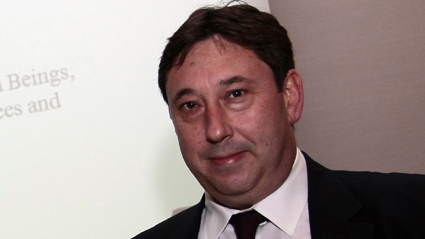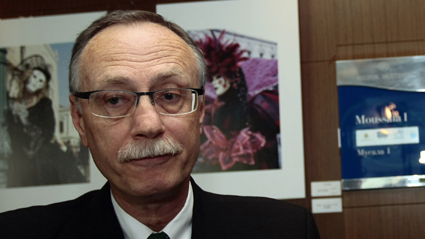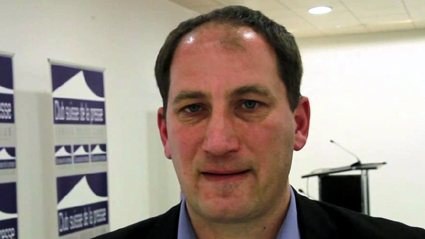More and more asylum seekers have been falling victim to human trafficking. Their vulnerability makes them easy prey to traffickers who promise to take them to the “promised land” – Europe – for hefty sums. Often refugees coming from the Middle East first set foot on European soil here, in Bulgaria, after crossing over from Turkey illegally. The refugee flows from Africa that cross the Mediterranean have been placing Italy and Greece in an impossible position. An international conference in Sofia organized by the National Commission for Combating Traffic in Human Beings, the Council of Europe and the United Nations High Commissioner for Refugees (UNHCR) with the participation of a number of NGOs from more than a dozen countries discussed possible solutions to the snowballing problem.
 The wave of refugees from Syria that swept over Bulgaria almost three years ago caught the country totally off guard. And though the situation in the refugee centres has improved the problem is still a hot potato. The EU has been focusing on the evaluation procedures for granting refugee status and on the distribution of asylum seekers across Europe. For now, combating human trafficking seems to have been put on the back burner even though well-organized traffickers have been making millions out of the despair of refugees. “Bulgaria has been working actively to prevent and combat human trafficking”, said at the conference Deputy Minister of the Interior Tsvyatko Georgiev:
The wave of refugees from Syria that swept over Bulgaria almost three years ago caught the country totally off guard. And though the situation in the refugee centres has improved the problem is still a hot potato. The EU has been focusing on the evaluation procedures for granting refugee status and on the distribution of asylum seekers across Europe. For now, combating human trafficking seems to have been put on the back burner even though well-organized traffickers have been making millions out of the despair of refugees. “Bulgaria has been working actively to prevent and combat human trafficking”, said at the conference Deputy Minister of the Interior Tsvyatko Georgiev:
“Being an outer border of the EU, Bulgaria has in recent years been facing severe pressure from mixed migration flows: there are people who meet the international asylum criteria but also economic migrants coming from countries where there is no armed conflict but who are looking for a better life.”
In the words of Roland Weil from UNHCR, Bulgaria more than half of the migrants desperately trying to reach Europe are refugees who have fallen victim to traffickers.
 “In the absence of legal means to access the chosen destination many of these tens of thousands are using, daily smugglers and human traffickers to get there. Close to 100 percent of those entering Bulgaria are doing so irregularly and most – with the help of smugglers and human traffickers.”
“In the absence of legal means to access the chosen destination many of these tens of thousands are using, daily smugglers and human traffickers to get there. Close to 100 percent of those entering Bulgaria are doing so irregularly and most – with the help of smugglers and human traffickers.”
Illegal trafficking in people is now a lucrative business. Being a problem of multiple dimensions it needs an integrated comprehensive strategy to cover the countries of origin as well as the transit and final destinations, says Weil.
Dr. Constantin Hruschka from the Swiss Refugee Council says that this strategy needs to provide refugees with legal means to cross borders, including in the countries of the EU. In his words introducing refugee quotas is not going to solve the problem as it will be no more than a way to mechanically distribute asylum seekers, regardless of their individual fate or preferences.
 “The current migration flows towards Europe are illegal, as refugees have no other option. For years Switzerland offered asylum seekers visas so they could travel legally while waiting for the decision of the competent authority whether they will be granted refugee status. In time this option was dropped but we think that its re-introduction will safeguard refugees against an undertaking that will put their lives and health in danger, often organized by illegal traffickers”, says Dr. Hruschka.
“The current migration flows towards Europe are illegal, as refugees have no other option. For years Switzerland offered asylum seekers visas so they could travel legally while waiting for the decision of the competent authority whether they will be granted refugee status. In time this option was dropped but we think that its re-introduction will safeguard refugees against an undertaking that will put their lives and health in danger, often organized by illegal traffickers”, says Dr. Hruschka.
English version: Milena Daynova
Romania continues policy of gradual budget deficit reduction Romania should end the year with a budget deficit amounting to 8.4%, as compared to 9.4% at the end of 2024, as negotiated with the EU, PM Ilije Bolojan has announced. During his visit..
GERB-SDS party maintain their dominance in new parliamentary elections with 26.4%, show the results of a survey by the sociological agency "Trend". The poll was conducted on behalf of 24 Chasa daily through a direct standardized "face-to-face" interview..
A new path ahead for the European Union – this is what the President of the European Commission Ursula von der Leyen outlined in her annual state of the union address in Strasbourg a few days ago. To summarize – the economic and military..

+359 2 9336 661
